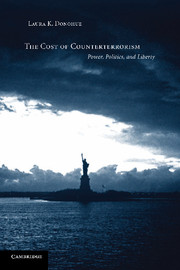2 - Indefinite Detention and Coercive Interrogation
Published online by Cambridge University Press: 29 June 2009
Summary
“No exceptional circumstances whatsoever, whether a state of war or a threat of war, internal political instability or any other public emergency, may be invoked as a justification of torture.”
Convention Against Torture, 1984“The use of force, mental torture, threats, insults, or exposure to unpleasant and inhumane treatment of any kind is prohibited by law and is neither authorized nor condoned by the US Government. Experience indicates that the use of force is not necessary to gain the cooperation of sources for interrogation. Therefore, the use of force is a poor technique, as it yields unreliable results, may damage subsequent collection efforts, and can induce the source to say whatever he thinks the interrogator wants to hear.”
US Army Field Manual, May 8, 1987“[Al Qaeda members attacked] purely civilian targets of no military value; they refused to wear uniform or insignia or carry arms openly, but instead hijacked civilian airliners, took hostages, and killed them; they have deliberately targeted and killed thousands of civilians; and they themselves do not obey the laws of war concerning the protection of the lives of civilians or the means of legitimate combat.”
John Yoo, Deputy Assistant Attorney General, and Robert J. Delahunty, Special Counsel, US Department of Justice Office of Legal Counsel, January 9, 2002“Some argue that since our actions are not as horrifying as Al Qaeda's we should not be concerned. When did Al Qaeda become any type of standard by which we measure the morality of the United States? We are America, and our actions should be held to a higher standard, the ideals expressed in documents such as the Declaration of Independence and the Constitution.”
Captain Ian Fishback, 82nd Airborne, US Army, September 16, 2005- Type
- Chapter
- Information
- The Cost of CounterterrorismPower, Politics, and Liberty, pp. 33 - 121Publisher: Cambridge University PressPrint publication year: 2008
- 1
- Cited by



